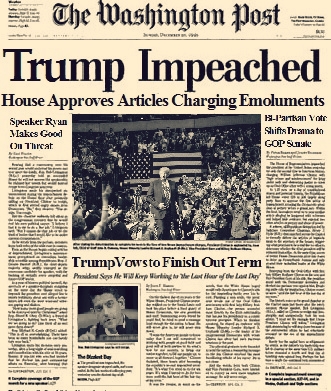“We’re making permanent tax policies Republicans originally crafted.”
—Dave Camp, the Republican chairman of the tax-writing Ways and Means Committee in the U.S. House of Representatives
![]() epublicans, at least those not completely ravaged by ideological stupidity, have finally been willing to embrace their substantial victory over Democrats, a victory represented by the last-minute deal to make the once-infamous Bush tax cuts permanent.
epublicans, at least those not completely ravaged by ideological stupidity, have finally been willing to embrace their substantial victory over Democrats, a victory represented by the last-minute deal to make the once-infamous Bush tax cuts permanent.
Early on New Year’s Day, Senate Republicans saw the light and accepted a Biden-engineered but Obama-blessed “compromise,” and later on New Year’s Day House Republicans—those 85 or so who for one reason or another realized they have won the tax debate—did the same.
All the while, most Senate and House Democrats couldn’t wait to get in line to vote to accept the deal (only 3 voted “no” in the Senate and only 16 voted “no” in the House), which, among other things, makes the Bush tax cuts, I’ll say it again, permanent.
Perhaps we should stop here and get Merriam-Webster‘s definition of the word permanent:
continuing or enduring without fundamental or marked change.
That’s a lot of what happened on New Year’s Day.
I watched Grover Norquist, yes, Grover Bleeping Norquist, right in front of CNN, GOP Jesus, and everyone, bless his fellow Republicans as they were about to vote to do what conservatives a decade ago only dreamed of doing: making the Bush tax rate cuts permanent for 99.3% of taxpayers.*
Did you get that? Conservatives in 2001 and 2003 couldn’t even pull that off. When right-wingers passed the original Bush tax cuts, they were only for ten years. Obama extended them for two years just before they were due to expire at the end of 2010—under Republican threats to ruin the economic recovery—and now they have been made a part of the Democratic Party canon. Bragging rights for tax cuts now belong to Democrats, which they may eventually regret.
Oh, don’t get me wrong. I’m not opposed to extending the tax cuts for most Americans. We can’t afford to jeopardize the fragile economic recovery by removing almost $200 billion a year—that’s roughly the cost of extending the cuts for the 99.3%—from the mix.
But we also can’t afford to extend the full rate cuts for that entire 99.3% permanently—at a cost of $1.9 trillion over 10 years—as doing so will serve to support the “starve the beast” tactic that radical conservatives like Grover Norquist have employed as part of their strategy to turn the country into a 19th-century small-government, rich-man’s paradise.
As I see it, Democrats may have inadvertently aided the Norquistas in their quest to some day drown government, at least part of it, in Grover’s bathtub.
There are, of course, many good things in the package passed, including a five-year extension of the 2009 stimulus expansion of tax credits for the working poor and other tax credits for the needy, including families trying to get their kids in college.
Those on long-term unemployment will get an extension for another year; doctors who accept Medicare won’t get screwed in the next year; tax breaks for wind energy and corporate research are continuing for at least another year; the Alternative Minimum Tax will be permanently indexed to inflation; the Republican-stalled farm bill will get unstalled for nine months—enjoy your cheaper milk.
Most of what Democrats got they got without having to offer significant spending cuts, which would have hurt the economic recovery. All good.
But besides the permanence of the Bush tax cuts, there are other bad things in the deal. The estate tax, which beginning on January 1 returned to Clinton-era rates (estates valued at $1 million were exempted and estate transfers over that amount were taxed at 55%), is now permanently Republican-friendly: a $5 million ($10 million for a couple) estate exemption (indexed to inflation) and a top tax rate of 40%, which, as Chris Van Hollen (D-Md) said, is a “sweetheart giveaway to the wealthiest 7,200 estates in the country.”
Capital gains taxes, which enabled the Mitt Romneys of the world to enjoy millions of dollars in income and pay only 15% in taxes on it, will rise to a mere 20% (23.8% if Obamacare taxes are figured in) for those couples making more than $450,000 ($400,000 for individuals). So, if you are Mitt Romney, you will have to find a way to live without that extra dough. Somehow I think he’ll cope.
But he may not even have to worry about coping. Bloomberg Businessweek reported the following about the increased capital gains tax in the new bill:
Many households with incomes above $500,000 won’t face the higher rates at all, because deductions are subtracted from gross income before the rates are assessed.
Finally, the deal Joe Biden brokered with Mitch McConnell does nothing but delay a fight over the sequester and over the dreaded and fast-approaching fight over the debt ceiling that Republicans have pledged to use as a tool to force Democrats to cut entitlements. We are guaranteed to go through all this nonsense again, though this time it would threaten an economic crisis that would dwarf the one we just averted.
President Obama, in his statement after the House vote on Tuesday night, said this:
Now, one last point I want to make — while I will negotiate over many things, I will not have another debate with this Congress over whether or not they should pay the bills that they’ve already racked up through the laws that they passed. Let me repeat: We can’t not pay bills that we’ve already incurred. If Congress refuses to give the United States government the ability to pay these bills on time, the consequences for the entire global economy would be catastrophic — far worse than the impact of a fiscal cliff.
Even though the President went to some trouble to explain that he will not negotiate with Congress over yet another stalemate over the debt ceiling, it is hard to see how he can avoid it, especially since Obama’s press secretary took the “constitution option” off the table recently:
This administration does not believe that the 14th Amendment gives the president the power to ignore the debt ceiling — period.
Section 4 of that amendment says,
The validity of the public debt of the United States, authorized by law, including debts incurred for payments of pensions and bounties for services in suppressing insurrection or rebellion, shall not be questioned.
Now, it is true that the President himself has not actually ruled out such a thing, saying this summer only that,
I have talked to my lawyers. They are not persuaded that that is a winning argument.
That statement, obviously, assumes court involvement. But any judiciary action—and some smart people believe the courts would not even get involved in this political matter—would require time. And Mr. Obama may conclude that by educating the public on the dire consequences of a failure to raise the debt ceiling, and given the extreme unpopularity of Republicans in Congress, that he will have plenty of latitude to do what needs to be do.
Additionally—and this may be the saving grace of this deal for Democrats—Obama said on Monday:
…if Republicans think that I will finish the job of deficit reduction through spending cuts alone — and you hear that sometimes coming from them, that sort of after today we’re just going to try to shove…spending cuts at us that will hurt seniors, or hurt students, or hurt middle-class families, without asking also equivalent sacrifice from millionaires or companies with a lot of lobbyists, et cetera — if they think that’s going to be the formula for how we solve this thing, then they’ve got another thing coming. That’s not how it’s going to work. We’ve got to do this in a balanced and responsible way.
That rather strong statement suggests that Obama has a definite strategy in mind for dealing with Republican threats to wreck the economy in order to get what they want. If he does, and if his strategy is successful, the bad things in the fiscal cliff deal will not look so bad.
And let us hope that what Democrats have done—setting in stone tax cuts that have partly contributed to our fiscal problems—will not someday hinder them as they attempt to protect vital government programs from those who mean to drag the country back into the 18th century.
_____________________________
*For those couples earning between $250,000 and $450,000, less generous Clinton-era tax exemptions and deductions will return, which will increase their tax liability and likely satisfy President Obama’s insistence of tax increases for the “top 2 percent”; but the tax rate cuts themselves are permanent for those couples making under $450,000, which is less than 1% of taxpayers.
















